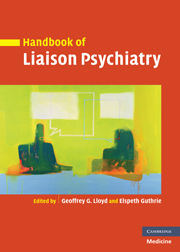Book contents
- Frontmatter
- Contents
- List of contributors
- Preface
- Part I Basic skills
- Part II Common psychiatric problems across the general hospital
- Part III Working with specific units
- 14 Neurological disorders
- 15 Cardiorespiratory disorders
- 16 Gastrointestinal disorders
- 17 Liver disorders
- 18 Endocrine disorders
- 19 Diabetes
- 20 HIV and AIDS
- 21 Renal disease
- 22 Musculo-skeletal disorders
- 23 Oncology
- 24 Head and neck cancer
- 25 Palliative care
- 26 Cosmetic procedures
- 27 Perinatal and gynaecological disorders
- 28 The intensive care unit
- 29 The burns unit
- 30 Psychocutaneous disorders
- 31 Genitourinary disorders
- 32 The emergency department
- Part IV Treatment
- Part V Different treatment settings
- Index
- References
17 - Liver disorders
from Part III - Working with specific units
Published online by Cambridge University Press: 10 December 2009
- Frontmatter
- Contents
- List of contributors
- Preface
- Part I Basic skills
- Part II Common psychiatric problems across the general hospital
- Part III Working with specific units
- 14 Neurological disorders
- 15 Cardiorespiratory disorders
- 16 Gastrointestinal disorders
- 17 Liver disorders
- 18 Endocrine disorders
- 19 Diabetes
- 20 HIV and AIDS
- 21 Renal disease
- 22 Musculo-skeletal disorders
- 23 Oncology
- 24 Head and neck cancer
- 25 Palliative care
- 26 Cosmetic procedures
- 27 Perinatal and gynaecological disorders
- 28 The intensive care unit
- 29 The burns unit
- 30 Psychocutaneous disorders
- 31 Genitourinary disorders
- 32 The emergency department
- Part IV Treatment
- Part V Different treatment settings
- Index
- References
Summary
The association between diseases of the liver and psychiatric disturbance has been a neglected area of clinical research despite the observations of ancient Greek physicians, notably Galen and Hippocrates, who had no doubt of the importance of the liver's influence on the mind. The term melancholia was derived from Galen's hypothesis that the disorder resulted from an excess of black bile while Hippocrates described behavioural changes in people whose madness he considered to be the result of bile (Chadwick & Mann 1950). Clinical reports of the neuropsychiatric consequences of liver failure began to appear in the 1950s following the emergence of hepatology as a distinct medical speciality and the development of units specifically designated for the treatment of liver disorders (Sherlock et al. 1954; Sumerskill et al. 1956). These reports were essentially descriptions of organic mental disorders consequent to the severe metabolic disturbance accompanying portal-systemic collateral circulation. Little attention was given to the affective disturbances and other so-called functional symptoms but this has changed in response to the increased prevalence of chronic hepatitis and the widespread establishment of successful liver transplant programmes (Collis & Lloyd 1992).
Psychiatric symptoms of liver disease
The pattern of psychiatric symptoms of liver disease is greatly influenced by whether the liver disease is acute or chronic in nature. In acute liver failure such as fulminating hepatitis, drug-induced necrosis or an acute deterioration in chronic liver disease, the clinical picture is dominated by overt signs of hepatic dysfunction.
- Type
- Chapter
- Information
- Handbook of Liaison Psychiatry , pp. 416 - 431Publisher: Cambridge University PressPrint publication year: 2007

